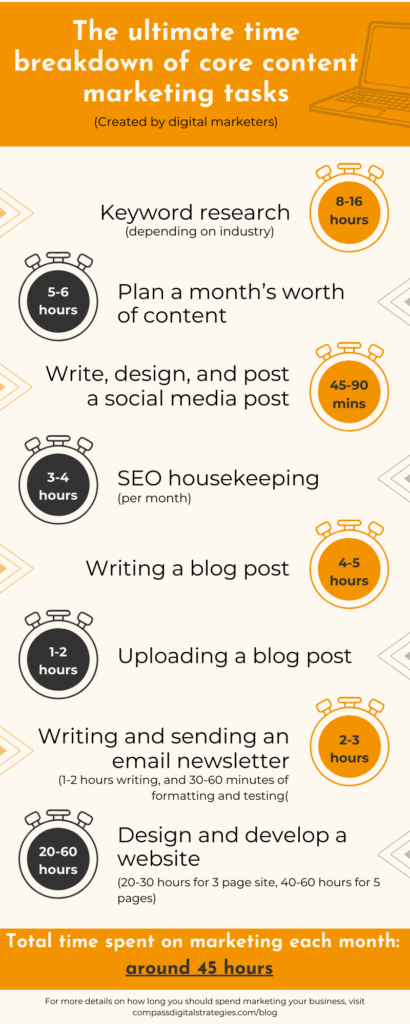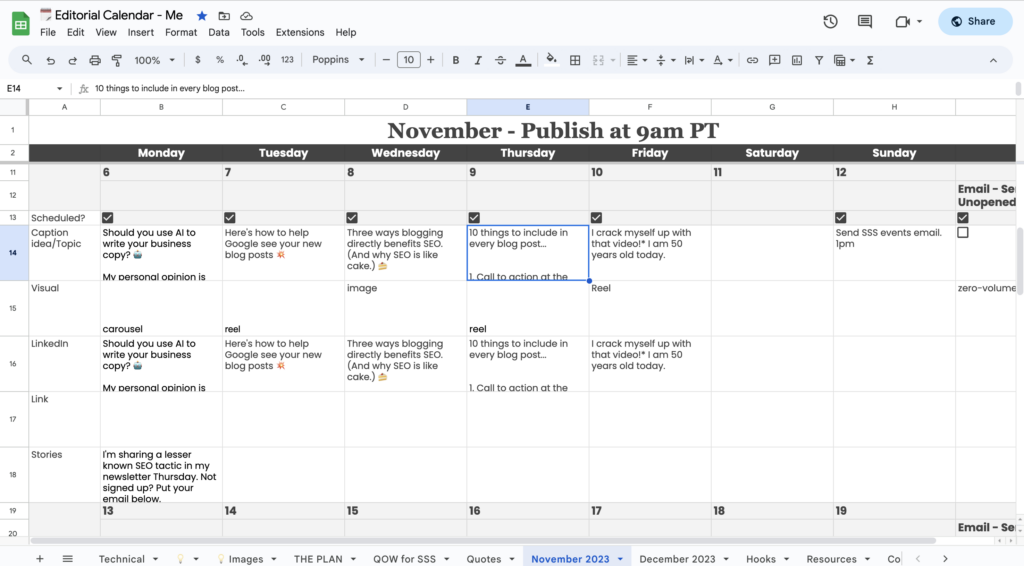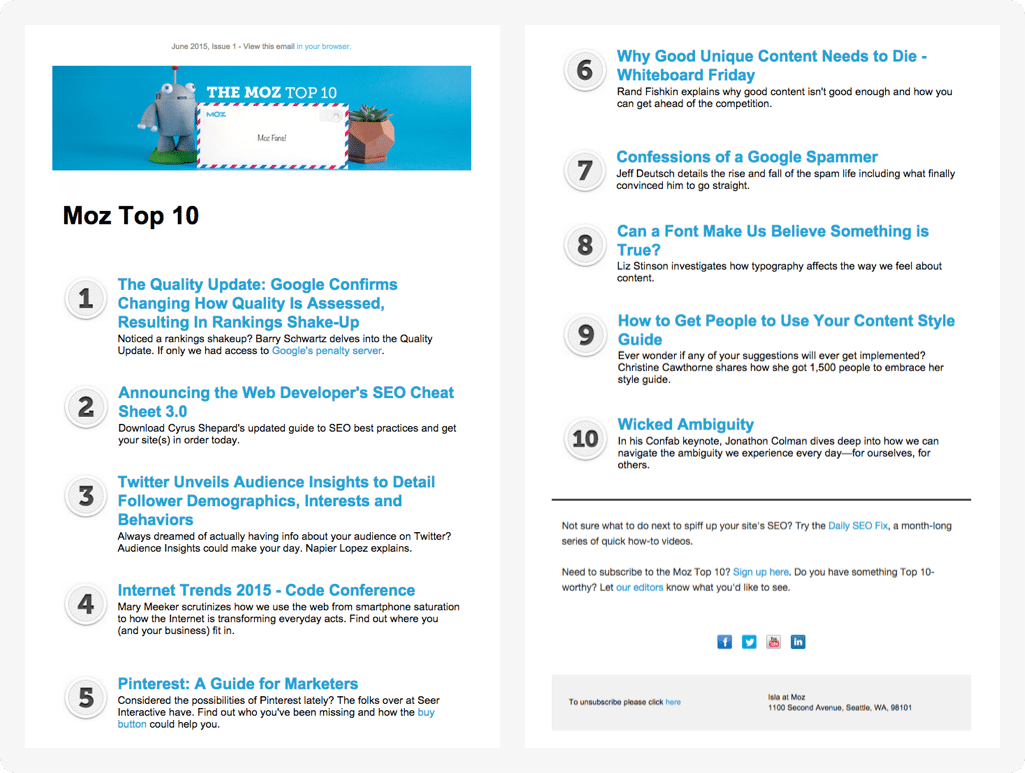When you become a business owner, you quickly learn there are never enough hours in the day (or week, or month) to complete every task. To keep things running smoothly you must become a prioritization maestro, adept at deciding whether you should tackle that bookkeeping, client admin, website redesign, or service restructure.
Or whether it can wait a bit longer.
When all your business tasks sit with you, it’s normal to drop one or two jobs to make time for the others. And for many solo-owned service businesses, the sacrifice comes in the form of marketing.
Marketing is the sacrificial lamb of business tasks
Promoting and marketing a business isn’t a quick job. You also need to keep plugging away at it so it remains effective. And it’s because it takes a lot of time (or it feels icky), many business owners push it to one side – especially when things are going well and generating new business isn’t a priority.
(In fact, an Australian-based marketing survey found that 86% of small businesses don’t bother with digital marketing, and 23.5% of small business owners don’t do any marketing at all.)

This is detrimental to your business. Without marketing you run the risk of:
- missing out on new custom, and opportunities to grow
- work drying up, and having no additional work in your pipeline
- being an unknown as there’s been no brand or authority building
- creating low-quality and ineffective content as there’s no marketing strategy or plan behind it
- wasting money on ad hoc marketing strategies that may be ineffective for your audience or service.
Dedicating just a few hours a week to marketing your business can have a significant effect on the growth of your business.
Marketing your company is important. And it’s been proven that dedicating just a few hours a week can make a significant difference in return and growth. Getting the word out about your company is important. But how much time do you need to budget for?
How much time you need for each core content marketing task
(Created by digital marketers)
My colleagues and I are time-tracking fanatics. Over the years we’ve amassed a vast amount of data that tells us how long it takes to complete core digital marketing tasks such as keyword research, blog writing, social media posting, and designing web pages. So I asked them if they’d share some of that data for this article and by doing so help me create an accurate time breakdown of 7 core content marketing tasks.
When I say ‘core content marketing tasks’ I mean the jobs that should be part of your weekly or monthly marketing work routine. Use it to plan how much time you need to do each thing, and prioritize which marketing streams you can feasibly fit into your schedule now. It’s here to set you up for more successes and wins, and banish the feeling of marketing overwhelm.
The time stamps and data you’re about to see have come from:
- Me, Barb Davids, an SEO and content marketing consultant with more than 20 years’ experience.
- Amy Baron Hatch, owner of Harmony Website Design, which specializes in designing and developing effective websites for small businesses.
- Rose Crompton, copywriter and content marketer for fellow freelancers and small businesses, specializing in website and blog copy.
- Lundyn, owner of The Final Touch, which specializes in escalating your social presence leading to increased visibility and authority.
Now you know who’s contributed, let’s dig into the data.

How long does keyword research take?
Answer: 8-16 hours (for most small businesses)
Keyword research is a foundation block in a solid SEO strategy. It involves finding the words and phrases a business’ ideal customer types into a search engine to find that business’ products and services. By creating content that targets the selected keywords, the business is telling search engines it wants to rank for them and show up on the results page for those words or phrases.
Completing your keyword research for the first time (i.e. going from having no keywords to a list of keywords you want to target and rank for) takes 8-16 hours. The time you’ll need is influenced by:
- the industry your business is in
- the number of keyword opportunities available
- how difficult it may be to realistically rank for certain keywords.
Creating a keyword list isn’t a one-time job. It’s an ongoing process, but not one you should overthink.
Review your keywords every 12 months. Check for new opportunities, and drop any words and phrases that aren’t working. Stay on top of your keyword game by spending 30-90 minutes each month revisiting your list.
Top tip: A good time to do this is when you’re putting ideas together for your content marketing calendar.
How long does it take to plan a month’s worth of content?
Answer: 10-12 hours per month
Planning and organizing content to publish can save you so much time compared to deciding on the fly. Knowing what’s going out when, and the topics you’ll discuss in your emails, blogs, and social media posts, will also lead to better quality content.
Getting a simple content calendar together using Excel and working out a month’s worth of content takes 10-12 hours. But there are tools you can use to speed up the process. For example, you can use an AI copywriter to create simple content, Canva templates to design your media, and a scheduling tool such as Postamatic to push the content out.
Want some more good news? After you’ve been creating content for a while you can recycle it by using it again 3-6 months down the line.

How long does it take to write, design, and post a social media post?
Answer: 45-90 minutes
Love it or hate it, social media is an integral part of many businesses’ marketing plans. (Unless you’re bold like Lush cosmetics and Tesla and shut some of them down. Eek.) What surprises most business owners is how long posting on social media can take. It’s not a quick 5-minute (or even 20-minute) task. This is a weird social media myth that just won’t vanish.
A more realistic timeframe is 45-90 minutes. And Lundyn breaks it down like this:
- 15-20 minutes for caption writing, research, and selecting hashtags
- 20-40 minutes for content design and editing (this is for IG reels, carousel posts, and graphic-only posts)
- 10-15 minutes for uploading, importing everything over to IG for posting, or popping it in the scheduling tool. (This involves checking all the boxes, adding cover photos, locations, tags, alt text, etc. if needed.)
Understanding that each part of the process takes time can make posting to social media easier to handle rather than it feeling like a resentful, time-sucking chore. Fortunately, as with planning content, you can start recycling the posts once you’ve been doing it for a while.
5 time-saving tips when posting to social media.
- Use Canva templates to quickly create attractive designs.
- Capitalize on trends when you can, as these can be easier wins and often follow a format.
- Rather than trying to post everywhere, find the right channels and only post there.
- Recycle posts so you don’t have to think up and create new content every time. This gets easier once you’ve been posting for a while.
- Don’t feel you have to use every posting format offered on the platform. If your audience responds better to photos than videos, create that style of post.
How long should I dedicate to SEO?
Answer: minimum 3-4 hours per month (10 is ideal)
There are several different arms to SEO. They include:
- keyword research (which I’ve already mentioned)
- on-page optimization
- content marketing
- link building.
Getting your entire SEO strategy in place may take about a month. For continued results keep tinkering and updating your website, copy, and design.
Spending 3-4 hours a month assessing your SEO efforts and working out what’s serving you well, what isn’t, and what new opportunities you can capitalize on will keep your website relevant and contribute to brand growth.
How long does it take to write a blog post?
Answer: 4-5 hours to write, and 1-2 hours to upload
Regularly publishing articles on your business blog can:
- build a trusting relationship between your ideal customer and your business
- drive more long-term organic traffic to your website
- give you content that can be repurposed
- increase conversions.
Of all the content marketing styles, blogging is definitely the most time consuming. And that’s largely because creating a blog doesn’t just involve writing. It also requires research (which can take 2 hours or more), getting the first draft down, editing and redrafting, and often finding images or infographics to support the article.
It takes a professional copywriter 4-5 hours to write an 800-2,000-word article. If you’re not a natural writer, give yourself some extra buffer time.
And that doesn’t include uploading the blog to your website and formatting it, which can take another 1-2 hours. Uploading involves making sure the text looks right, adding links, uploading images, positioning and resizing images, and adding any forms or calls to action buttons.
How long does it take to write and send an email newsletter?
Answer: 1-2 hours of writing, and 30-60 minutes of formatting and testing
How long it takes to write your email newsletters will depend on the format. Some newsletters are short blurbs and links to more content to read more. The Moz newsletter is a perfect example.

Others, such as Not Controversial by copywriter Nia Carnelio, are longer and include more text. They run more like articles, so will likely take longer to write.

A 600-word newsletter can take 1-2 hours to write, depending on the complexity of the subject, and another hour to:
- upload to your email platform
- send yourself a test email
- make any last-minute tweaks
- schedule.
How long does it take to design and develop a website?
Answer: 20-60 hours (depending on the number of pages)
How long it takes to design and develop a website will depend on:
- the number of pages
- the complexity of your site
- the platform you’re working with (WordPress, Wix, SquareSpace, etc.)
- whether you’re using a website template or code it yourself.
There are lots of other variables as well.
Generally speaking, a 3-page website will take 20-30 hours to complete, and a 5-page website will take 40-60 hours.
Top tip: If you have the budget, outsource the initial design and development. You can then ask for a crash course on how to maintain your site so you can make simple changes and updates as and when you need to.But this is how long it takes a professional designer/developer to complete. If you’re new to website design and development it may take longer. You’ll need to factor in learning time as you get to grips with how your web platform works.
Total time spent on marketing each month: around 45 hours
That may sound like a lot. But when you consider that the average number of working hours in a month in the US is 173 hours, it’s fairly minimal.
The approximate I’ve given is based on the assumption you:
- will spend time regularly updating keywords and researching new opportunities
- are planning monthly content rather than doing it ad hoc
- are focussing on 1-2 social media channels and posting to each one just once a week
- have an SEO plan in place so you’re working on maintaining your SEO strategy
- publish one blog post per month
- send one email newsletter per month
- are designing and developing your website for the first time.
Of course, the more you do something the quicker you’ll get at it. And you may find that as your marketing processes develop the time you need to spend each month on these core elements will decrease.
Want some support to get your marketing done?
It’s easy to push marketing tasks to the bottom of your to-do list when you’ve got so many other plates to spin – even when you know how long things will take. If you’re looking for some accountability so your content marketing becomes an efficient and useful part of your business, join my fluff-free, let’s-get-this-sh!t-done Small Business Sweet Spot group coaching program.
